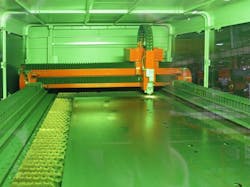Fiber laser cutting cell works 24/7, but operator only works a single shift
Over the last few years, steel storage manufacturer Bisley (Newport, South Wales) has diversified its business and introduced a vast range of additional steel products for the office. Last year, it entered the industrial storage arena with new ranges of tool cabinets, cupboards, and wall cabinets.
To support the increased production levels, at the end of last year the company installed a Bystronic 3kW BySprint 3015 Fiber with ByTrans 3015 Extended automated sheet handling and storage. It joined two 5kW CO2 laser cutters of a different make installed over 10 years ago and five turret punch presses at its Newport factory.
The fiber laser cutting cell operates 24/7 and is devoted to cutting mild steel sheet ranging in thickness from 0.7 to 1.2mm as required by newly formed Bisley Industrial Storage. Restricting the spread of gauges maximizes the potential for lights-out running.
Office furniture production lines are also supplied with parts produced on the BySprint Fiber. However, on this side of the business the variety of gauges is greater. Some 40% of throughput is 0.5mm, rising to 2mm for supports.
“The Bystronic fiber machine cuts thin-gauge steel faster than our CO2 lasers, despite having a laser source 40% less powerful, and is now our main laser profiling resource," says Paul Ostrolenk, Bisley’s technical director. "These days, it is difficult to see why anyone would buy a CO2 laser for cutting thin-gauge material now that fiber laser technology has matured. As it is so fast, we decided to order a 12-shelf automated sheet storage system. It wastes little time presenting the next sheet to the working area and retrieving the skeleton, so production is virtually continuous. It was the build quality and simplicity of the automated sheet feeding that decided us in favor of the Bystronic solution, together with its ability to be fed with material manually like a normal machine when the need arises, unlike some other systems we looked at.”
The storage unit holds 18 tons of mixed gauge steel, sufficient to keep the fiber laser system running for 45 hours—right over a weekend. So a single operator only works a normal-day shift, entering programs and shaking components from each sheet after they have been cut. Meanwhile, the automated laser cell carries on producing 24 hours a day, seven days a week.
Payback on investment will therefore be rapid, especially as the fiber consumes less power than a CO2 machine, does not need costly resonator gases, and requires less maintenance.
The company operates a world-class factory covering 41,000m2, producing approximately 2000 cabinets per week. Nearly £70 million has been spent on capital projects since 1997, including high-speed blanking and forming lines, robotic welding, high-speed powder painting, and flat-panel coating.
The company uses around 24,000 tons of steel annually, and only about one-fifth of the steel is processed through the three laser cutting machines. The remainder is turned into high-volume items like uprights and drawer bodies, of which 35,000 are made per week.
In August 2015, the company introduced a range of products for the garage trade and automotive sector as well as a selection of work benches. In the early days, the numbers will be relatively low. The automated fiber laser cell will provide quick, economical turnaround of small batches of components.
